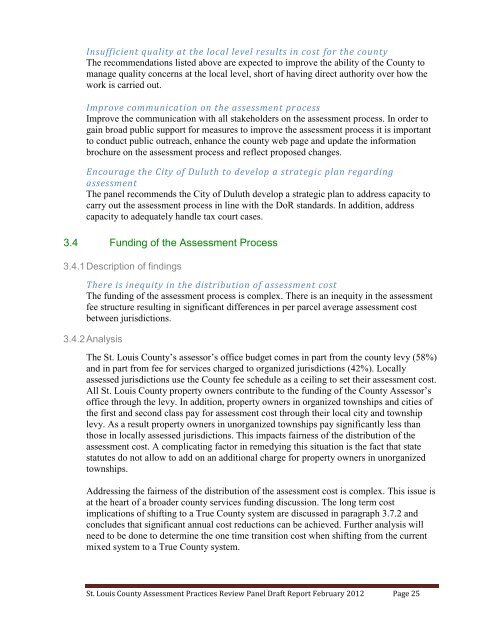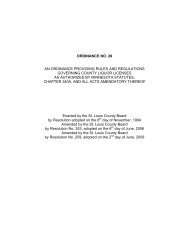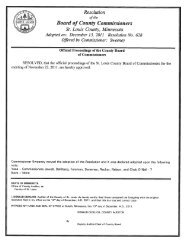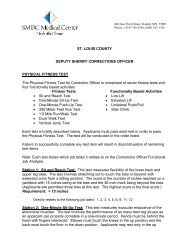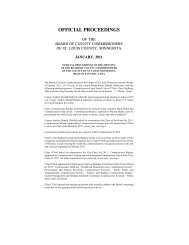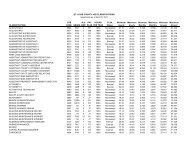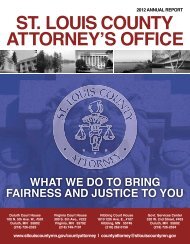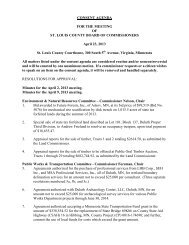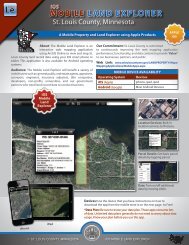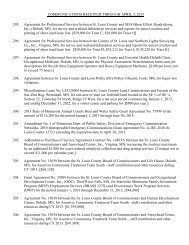Assessment Practices Review Panel - St. Louis County
Assessment Practices Review Panel - St. Louis County
Assessment Practices Review Panel - St. Louis County
You also want an ePaper? Increase the reach of your titles
YUMPU automatically turns print PDFs into web optimized ePapers that Google loves.
Insufficient quality at the local level results in cost for the county<br />
The recommendations listed above are expected to improve the ability of the <strong>County</strong> to<br />
manage quality concerns at the local level, short of having direct authority over how the<br />
work is carried out.<br />
Improve communication on the assessment process<br />
Improve the communication with all stakeholders on the assessment process. In order to<br />
gain broad public support for measures to improve the assessment process it is important<br />
to conduct public outreach, enhance the county web page and update the information<br />
brochure on the assessment process and reflect proposed changes.<br />
Encourage the City of Duluth to develop a strategic plan regarding<br />
assessment<br />
The panel recommends the City of Duluth develop a strategic plan to address capacity to<br />
carry out the assessment process in line with the DoR standards. In addition, address<br />
capacity to adequately handle tax court cases.<br />
3.4 Funding of the <strong>Assessment</strong> Process<br />
3.4.1 Description of findings<br />
There is inequity in the distribution of assessment cost<br />
The funding of the assessment process is complex. There is an inequity in the assessment<br />
fee structure resulting in significant differences in per parcel average assessment cost<br />
between jurisdictions.<br />
3.4.2 Analysis<br />
The <strong>St</strong>. <strong>Louis</strong> <strong>County</strong>’s assessor’s office budget comes in part from the county levy (58%)<br />
and in part from fee for services charged to organized jurisdictions (42%). Locally<br />
assessed jurisdictions use the <strong>County</strong> fee schedule as a ceiling to set their assessment cost.<br />
All <strong>St</strong>. <strong>Louis</strong> <strong>County</strong> property owners contribute to the funding of the <strong>County</strong> Assessor’s<br />
office through the levy. In addition, property owners in organized townships and cities of<br />
the first and second class pay for assessment cost through their local city and township<br />
levy. As a result property owners in unorganized townships pay significantly less than<br />
those in locally assessed jurisdictions. This impacts fairness of the distribution of the<br />
assessment cost. A complicating factor in remedying this situation is the fact that state<br />
statutes do not allow to add on an additional charge for property owners in unorganized<br />
townships.<br />
Addressing the fairness of the distribution of the assessment cost is complex. This issue is<br />
at the heart of a broader county services funding discussion. The long term cost<br />
implications of shifting to a True <strong>County</strong> system are discussed in paragraph 3.7.2 and<br />
concludes that significant annual cost reductions can be achieved. Further analysis will<br />
need to be done to determine the one time transition cost when shifting from the current<br />
mixed system to a True <strong>County</strong> system.<br />
<strong>St</strong>. <strong>Louis</strong> <strong>County</strong> <strong>Assessment</strong> <strong>Practices</strong> <strong>Review</strong> <strong>Panel</strong> Draft Report February 2012 Page 25


